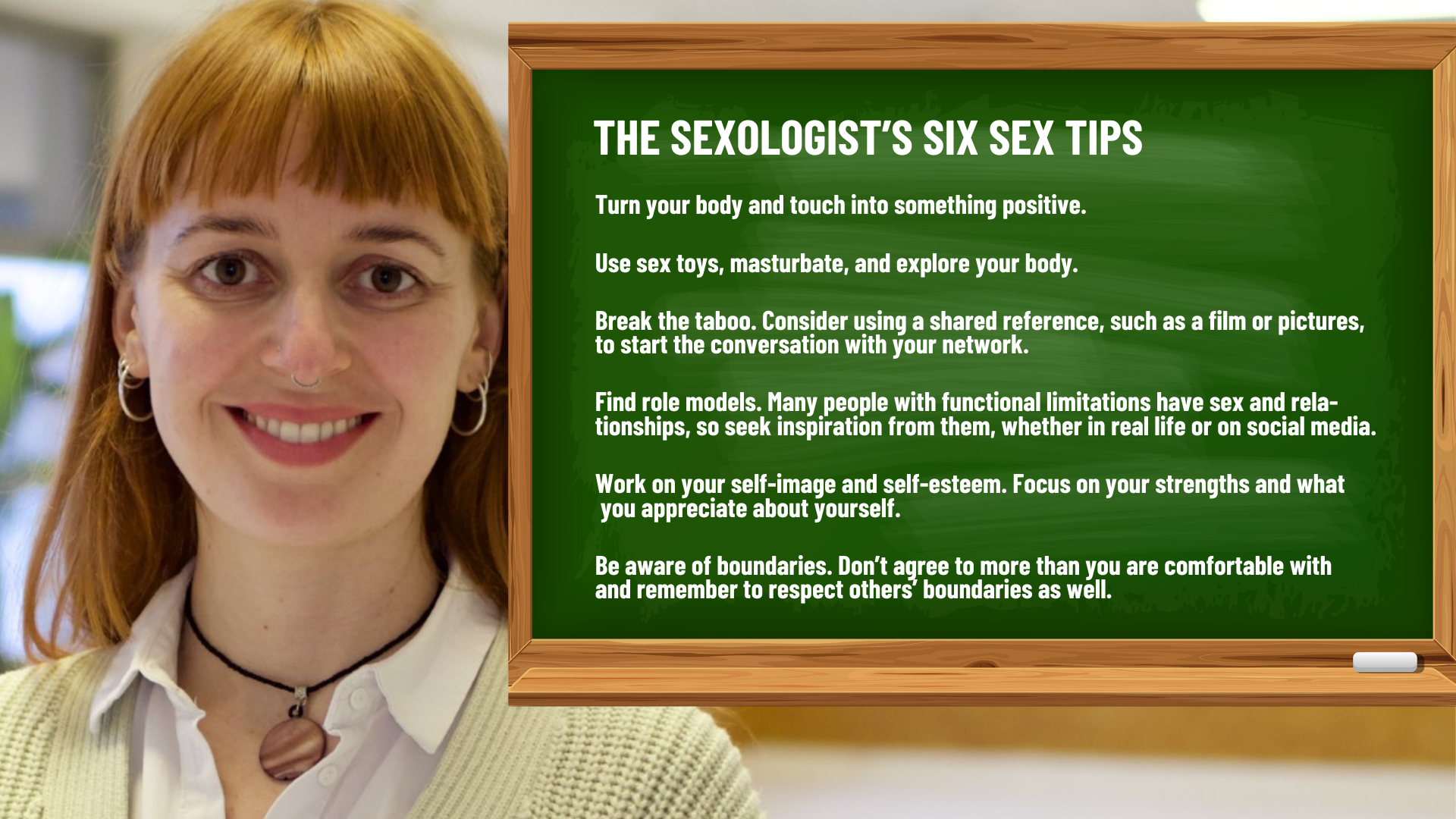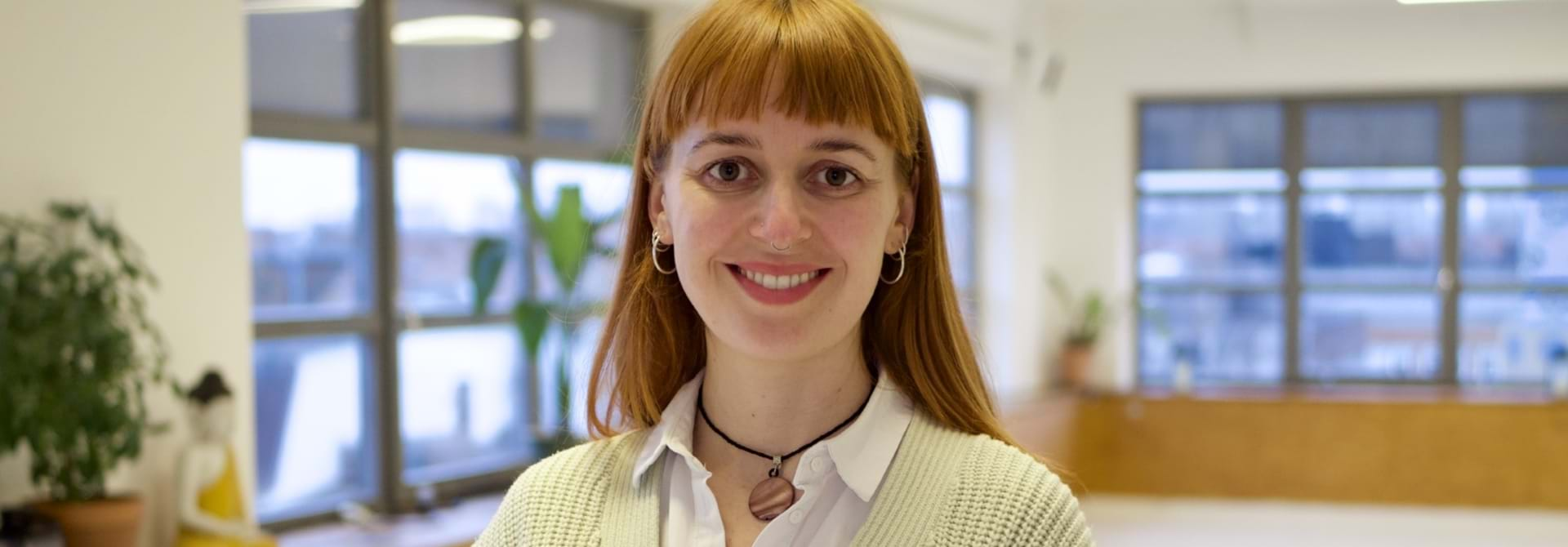Sexologist on CP: Be open-minded and talk about sex
Topics like sexuality and intimacy are often considered taboo, and for people with Cerebral Palsy (CP), the barriers may be even greater. Sexologist Sofie Krog encourages people to let go of their fear of touch and start a dialogue.
Many people feel uncomfortable with sex and find it difficult to talk about, but sexuality is a core part of human life and identity, no matter your background, body, or circumstances. For people with CP or other functional limitations, sexuality is often shrouded in taboos and misunderstandings, which can lead to feelings of isolation and inadequacy.
And these very feelings, combined with potentially low self-esteem, are among the key themes that sexologist Sofie Krog encounters in her work with people with CP.
"‘Can I be an attractive partner? Can I have a sex life?’- these are questions that weigh heavily on people’s minds," says Krog, who runs her own practice as a sexologist and works as a sexuality consultant at SUMH (Sammenslutningen af Unge Med Handicap; the Association of Young People with Disabilities).
She is visiting the Elsass Foundation to give a talk as part of the annual Sex Week, a health and sexuality education campaign organized for the tenth year by Sex & Society, aiming to bring discussions of gender, body, and sexuality into focus.
Krogh reassures that there is help available. She works with ‘reframing’ and ‘two-way taboo,’ methods she uses when meeting people with CP, with or without a caregiver, in her consultation room in Northwest Copenhagen.
The fear of crossing boundaries
A two-way taboo can arise in many different relationships. It may occur between healthcare professionals and patients, but also between a person with CP and their caregiver. In these situations, both parties may fear overstepping boundaries, crossing a line, or not knowing the right thing to say.
"When it comes to people with CP and their caregivers, the two-way taboo arises when the person with CP doesn’t dare to bring up a sexual topic, or when the caregiver is too afraid to ask," Krog explains and elaborates:
"The taboo comes from the fear of crossing the boundaries of what is considered appropriate behaviour, whether one might violate the other’s or one’s own sense of modesty or overstep a professional boundary."
Krog’s advice is therefore to be open-minded and practice having conversations about sexuality.
"It’s not about having all the answers. The most important thing is to show that you are open and willing to listen. As a caregiver, you should invite dialogue instead of waiting for the person with CP to take the initiative. In most cases, it’s about creating a safe space where people can talk openly about their needs and thoughts," she emphasizes.

Sofie Krog runs her own practice as a sexologist and works as a sexuality consultant at SUMH.
FOTO: Lise Pleidrup
"It’s not about having all the answers. The most important thing is to show that you are open and willing to listen. As a caregiver, you should invite dialogue instead of waiting for the person with CP to take the initiative. In most cases, it’s about creating a safe space where people can talk openly about their needs and thoughts."
Reframing: From limitations to possibilities
Another important approach Krog uses in her work as a sexologist is reframing. This method involves rewriting negative self-narratives into constructive and positive ones. It’s about changing the way people view themselves and their possibilities.
"Many people with CP have heard or told themselves from an early age that they can’t do the same things as others. That mindset can be difficult to break, but reframing is precisely about challenging those thoughts," Krog explains.
As an example, she points to a sentence like, “I don’t know how to do this.” Through reframing, it can be turned into: “I am in the process of exploring my sexuality.”
"It sounds simple, but it can have a huge impact on how people see themselves and their opportunities. It’s not about ignoring limitations but about creating a new perspective that allows for growth," she emphasizes.
Sexuality is for everyone
She hopes her talk will inspire both people with CP and their caregivers to start conversations about sexuality and intimacy. Because, as she says, it’s an important part of life, regardless of whether you have functional limitations.
"Sexuality is a fundamental part of being human. By breaking taboos and fostering openness, we can give more people the opportunity to explore and enjoy this aspect of life," she says.

